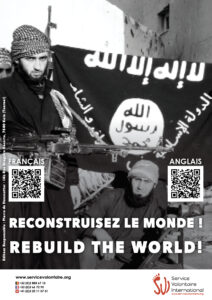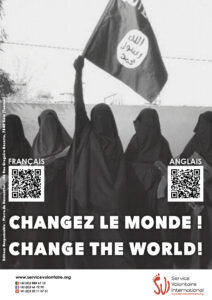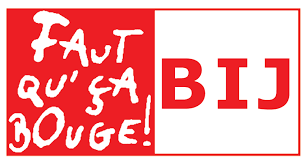The Islamic State’s History
Do these scenes shock you? You do not like them? Good! Yet, there was a time, not so long ago, when they seemed normal. We would like to believe that racism, hatred of the other, and the North’s patronizing attitude towards the South are things of the past, but they are not.
 The far-right still flourishes today, nationalist parties are gaining ground across the globe, religious fanatism is becoming the norm, as evidenced by the appearance of the Civitas posters on the campuses (“against the democratic dictature”). These ideologies become “normal” once again. It is no longer surprising to see members of the Lepen family in the second round of the French presidential elections, millions of Americans vote for Trump, Hungary and Poland slip in autocracy, Flanders wonder if one can govern with the far right… We end up not daring to talk about religions out of fear. Are those facts more or less shocking than these old pictures?
The far-right still flourishes today, nationalist parties are gaining ground across the globe, religious fanatism is becoming the norm, as evidenced by the appearance of the Civitas posters on the campuses (“against the democratic dictature”). These ideologies become “normal” once again. It is no longer surprising to see members of the Lepen family in the second round of the French presidential elections, millions of Americans vote for Trump, Hungary and Poland slip in autocracy, Flanders wonder if one can govern with the far right… We end up not daring to talk about religions out of fear. Are those facts more or less shocking than these old pictures?
We would like to believe it is preferable to remain blind to these despotic abuses and to turn them into mere anecdotes, but this would amount to making this type of destructive and libellous acts trite.
In the Service Volontaire International, a youth organisation, we consider it is essential to look critically at both our present and our past, because, as Churchill affirmed, “a nation which has forgotten its past can have no future”. We do not forget.
Racism, fascism, obscurantism must not become trivial!
Extremism spares no one. No religion. No culture. In a previous article, we had mentioned the atrocities committed by the Ku Klux Klan in the United States. Unfortunately, the hatred of ethnocultural differences knows neither border nor nationality. You must already have guessed this article’s topic by seeing the two photographs above. Let us travel through History from the origins of ISIS until today, and try to understand better what led to the horrors we know.
First of all, we should remember that the armed conflict that ravaged Iraq and Syria over the last decade was largely religious, besides growing from geopolitical issues. These two countries are located between two big rival nations: Saudi Arabia (mostly Arab and Sunni), and Iran (mostly Persian and Shiite). Sunni and Shia are the two main branches of Islam, which originally separated after the death of Prophet Muhammad in 632. Saudi Arabia and Iran are both theocratic dictatorships which, in spite of their religious divergence, strictly apply the Islamic law on their territory.
In 2003, Iraq was ruled by Saddam Hussein, a Sunni Muslim, while Syria was governed by Bashar al-Assad, an Alaouite (a religious confession derived from Shia).
Let us start with Iraq. In March 2003, the United States form an international coalition and invade the country in barely three weeks. Under the guise of fighting terrorism and weapons of mass destruction, they hog the abundant oil ressources of Iraqi territory. They forbid Hussein’s political party and dismantle the official army, resulting in the constitution of several autonomous Sunni militias whose goal is to fight away the American military. One of these militias will pledge allegiance to and rejoin sadly famous Al-Qaeda (which, ironically enough, had been financed by the USA in its early stages). Its main objective is to fight the international coalition and the Shiite Muslims on the national territory. This is the beginning of the civil war. In 2006, Al-Qaeda merges with five other independent militias and proclaims itself the “Islamic State of Iraq”. The war will only stop in 2009, after the nationalisation of Iraq oil and the withdrawal of American troops.
But 2011 is the beginning of the Arab Spring: in several countries of the Arab and Muslim world, popular revolts burst to try and overthrow regimes that had been in place for years. Syria is no exception, but the rebellions get violently repressed by the al-Assad government. Syrian soldiers decide to abandon their position and constitute the Free Syrian Army, an armed group supported and (sometimes secretly) financed by different Western nations. The growing instability in the region leads to the creation of new jihadist factions, as the al-Nusra Front (an Al-Qaeda branch), which in 2013 will unite to the Islamic State of Iraq in order to form the Islamic State of Iraq and the Levant, also known as the Islamic State of Iraq and Syria: ISIS.
From June 2013, ISIS spreads across Syria and Iraq, captures several important cities in both countries (Raqqa, Mosul…) and, at the same time, seize their military and oil resources. Everywhere in the world, independent groups are formed and pledge allegiance to ISIS. In June 2014, the Islamic State proclaims the implementation of a caliphate on the territories it controls.
The daily life of the civilians in the occupied zone becomes a living hell. Everyone must obey the Islamic law, and horror is everywhere. Women who don’t wear the niqab get whipped or stoned; homosexuals are thrown off roofs; opponents to the regime get decapitated with their heads either fixed on top of spikes planted on roundabouts, or left for children to play with; bodies are left lying on the roads so the cars crush them until there is nothing left of them.
In September 2014, the USA form a new 69-country international coalition to fight against ISIS. Over the three following years, ISIS will gradually be pushed back by the coalition, the Syrian and Iraqi governments, and different independent groups (mostly representing ethnic minorities), until losing control of all of its conquered territories.
That is how, by late November 2017, ISIS loses its last villages. Nevertheless, tensions remain strong in the region between the local governments and ethnic minorities (as the Kurdish in the North). The Islamic State might be dead, but its ideology is far from being buried.
Although disastrous, this situation opens the way to reflection about deep questions which are very hard to answer precisely. According to you, is the international community legitimate to intervene in conflicts between third countries and the Islamic State? Do you think these different interventions through History have had more positive or negative effects? To you, do these conflicts have more to do with religion or geopolitics?
We are Service Volontaire International. Through volunteering, we aim at encouraging people to adopt a new critical outlook on the world around them. We advocate interculturality as an essential value for building a more tolerant world. As a Youth Organisation recognised by the Belgian Fédération Wallonie-Bruxelles, our mission is to help the younger generation to become responsible, active, critical and united citizens.
Let us rebuild the world together!
Sources :
- Rtl.fr. 2020. 2017 Signe La Fin (Territoriale) De L’État Islamique. (en ligne) Disponible sur : https://www.rtl.fr/actu/international/2017-signe-la-fin-territoriale-de-l-etat-islamique-7791538100 (Consulté le 3 novembre 2020).
- Youtube.com. 2020. Quelle Est La Différence Entre Daesh Et Al Qaïda ?. (en ligne) Disponible sur : https://www.youtube.com/watch?v=pn6KzZOIGgM (Consulté le 3 novembre 2020).
- Rtl.fr. 2020. Syrie : 9 Scènes D’horreur De La Vie Quotidienne À Raqqa, Capitale De Daesh. (en ligne) Disponible sur : https://www.rtl.fr/actu/international/syrie-9-scenes-d-horreur-de-la-vie-quotidienne-a-raqqa-capitale-de-daesh-7782582127 (Consulté le 4 novembre 2020).
- Youtube.com. 2020. Syrie : Les Dessous Du Conflit | ARTE Reportage. (en ligne) Disponible sur : https://www.youtube.com/watch?v=uQ4kI2b1B58 (Consulté le 3 novembre 2020).
- Universalis, E., 2020. ÉTAT ISLAMIQUE Ou DAECH Ou DAESH. (en ligne) Encyclopædia Universalis. Disponible sur : https://www.universalis.fr/encyclopedie/etat-islamique-daech-daesh/ (Consulté le 3 novembre 2020).
- Fr.wikipedia.org. 2020. État Islamique (Organisation). (en ligne) Disponible sur : https://fr.wikipedia.org/wiki/État_islamique_(organisation) (Consulté le 3 novembre 2020).
- Youtube.com. 2020. État Islamique – Résumé De La Guerre Contre Daech. (en ligne) Disponible sur : https://www.youtube.com/watch?v=3FRr-MuQ_wA (Consulté le 3 novembre 2020).
- Civitas : qui se cache derrière l’association catholique devenue un parti politique ? https://www.rtl.fr/actu/politique/civitas-qui-se-cache-derriere-l-association-catholique-devenue-un-parti-politique-7783901433
- Messire Dieu, premier servi” Étude sur les conditions de la prise de parole chez les militants traditionalistes de Civitas https://www.cairn.info/revue-politix-2014-2-page-59.htm













